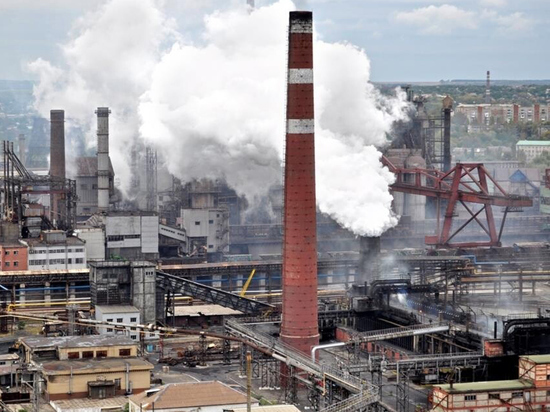Oleg Tsarev explained the distortions of nationalization in the DPR
[ad_1]

On September 30, the head of the DPR, Denis Pushilin, signed a decree on the nationalization of the property of 142 Ukrainian citizens and two companies. The list of individuals and legal entities whose property will be nationalized is published on the website of the head of the Donetsk Republic. It included oligarchs, communists, criminal authorities, law enforcement officers, Ukrainian politicians and businessmen of various orientations. They are united only by the presence of Ukrainian citizenship and assets on the territory of the DPR.
If we assume that the leadership of the DPR suddenly decided to make a “left turn” and move along the path of building socialism, then why is the leader of the Communist Party of Ukraine Petro Symonenko included in the list along with the oligarchs Rinat Akhmetov and Sergey Kurchenko (although what kind of property can a real communist own – but these questions should be asked by Simonenko and his party comrades-in-arms)? If we are talking about elements hostile to Russia, then where does the former head of the Ministry of Internal Affairs of Ukraine under Yanukovych Vitaliy Zakharchenko, who was forced to flee to the Russian Federation after the coup d’etat? Or the ex-Prosecutor General of Ukraine, also in the days of Yanukovych, Viktor Pshonka? In addition to them, the list includes the head of the Opposition Platform for Life Yuriy Boyko, crime boss Vladislav Dreger, the former mayor of Donetsk Alexander Lukyanchenkov and many others. There are 142 faces in total. Their property is transferred to state ownership without compensation.
I spoke about the oddities of the MK decree with the ex-deputy of the Verkhovna Rada of Ukraine, the former speaker of the parliament of Novorossia Oleg Tsarev.
– Why do you think this decree appeared right now?
– The list of objects subject to nationalization was published the night before the signing of the Treaty on the accession of the DPR to the Russian Federation. The rush is disturbing.
It can be assumed that the leadership of the DPR used the last night to resolve property issues.
I have good friends on this list, there are people I know, there are people I have only heard of. Among them there are those who really somehow showed themselves in anti-Russian activities. And there are those who live in the territory of the Russian Federation, who were forced to flee Ukraine because of persecution, they are fruitfully building a business here, paying taxes in the Russian Federation. There are even people who are involved in establishing life in the liberated territories of Ukraine. That is, these are people of different political views, and the only thing that unites them all is the presence of property on the territory of the DPR.
Since there are citizens on this list who are both pro-Russian and anti-Russian, we can say that the leadership of the DPR in this way solved the issue not political, but the issue of property. And rather hastily.
– Do you want to say that Russian legislation is not yet in force in the republics?
– I want to say that the issue of ownership in the new territories that join the Russian Federation is very acute. In the DPR and LPR, a number of objects were taken into management for many reasons, and for 8 years those who manage them got used to the fact that these objects were, as it were, “theirs”, although they did not buy them.
For the new territories of the Kherson and Zaporozhye regions, as far as I know, the same decision will most likely be made as for the Crimea. That is, Ukrainian property documents will be transferred to the Russian database. And only a limited number of owners who clearly showed their anti-Russian position will have their property nationalized. I mean not state or municipal, but private property. That is, in Zaporozhye and Kherson, the Crimean scheme will be applied, but in Donetsk, options are possible. As far as I understand, in order to get an additional argument in favor of a variant that would suit the Donetsk elites more, this decree was signed.
– How can the persons on the list challenge this decision?
– I’m not 100% sure that all the property will be taken away from these people. I have a good friend – Valera Golenko. He was the chairman of the Luhansk Regional Council. He condemned and did not recognize Maidan in 2014 by the decision of the Regional Council.
By the decision of the Presidium of the Regional Council, we jointly decided to call a referendum on the independence of the LPR. Despite his services to the republic, he was included in the LPR sanctions list in August. Together, we managed to include a number of well-known Russian politicians in order to exclude him from this list. After the DPR becomes part of the Russian Federation, the persons on the list will have the opportunity to appeal against the decision to nationalize their property. In Russia, nationalization is a rather controversial thing.
– Property after all becomes the property of the state?
– Formally – yes. But a lot of facilities there are now under management. They appeared as if “quasi-owners”. After nationalization, they will have the opportunity to buy this property if there are living legal owners who are in the Russian Federation. Donetsk is a very rich city. There are still many working enterprises there, some of which were built by tsarist Russia, they belonged to foreign owners and were nationalized and reconstructed under Soviet rule. Part was built during the Soviet era. After the collapse of the USSR, all this passed into private hands. This is a very sweet piece of cake.
[ad_2]
Source link






